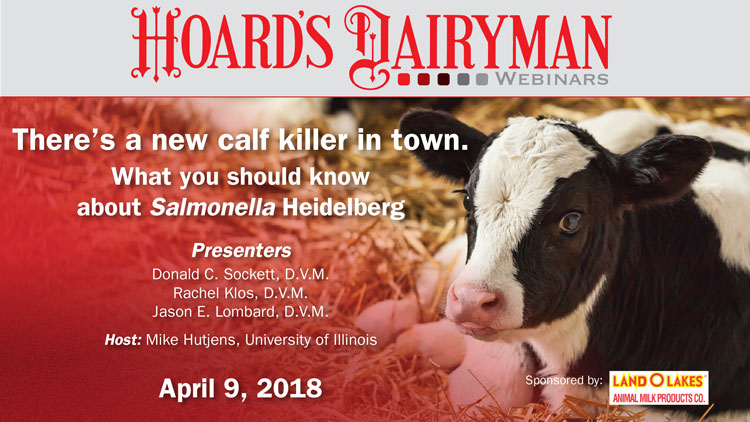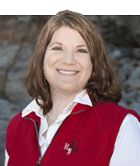
“There’s a new calf killer in town” was the title of the April 2018 Hoard’s Dairyman webinar. The title lived up to its billing as three veterinarians discussed Salmonella Heidelberg, a disease that was identified less than two years ago but has quickly claimed the lives of the youngest members of the herd.
Rachel Klos is a veterinarian and serves as an epidemiologist for the Wisconsin Department of Health Services — that is the human side of the equation. She conducts interviews when zoonotic cases break to better understand the symptoms, mode of transmission, and potential illness link from animals to people and visa versa.
Klos provided some suggestions to curb the spread of the disease in humans:
- Thoroughly wash hands after working with animals
- Remove barn clothes before entering the home
- Do not let children work around sick calves
- Do not consume food in areas with animals
- Do not consume raw milk
Salmonella Heidelberg is resistant to antibiotics, but calves generally do not live long enough to show symptoms to even be treated. They may appear fine in the morning, but could be dead by early afternoon.
Because of advances in technology, the genetic code of bacteria that affect humans can be compared to the code of the bacteria affecting animals. The DNA markers can determine if it is indeed the same strain — or a related strain — by analyzing their profiles.
Don Sockett, D.V.M., works for the Wisconsin Veterinary Diagnostic Laboratory as an epidemiology/microbiologist. He shared that many dairy and beef calves leave the state and because of the transportation involved, Salmonella Heidelberg has spread beyond its borders.
While colostrum feeding is still highly encouraged, it does not provide any immunity to Salmonella Heidelberg. Not all salmonellas behave the same and since S. Heidelberg is not commonly found in mature animals, cows cannot provide immunity. Vaccinations are still important to support overall animal health, but they provide no protection from shedding the disease.
He encouraged farmers to clean and disinfect pens, trailers, and other equipment that calves come in contact with after each use. But, even the best management practices cannot prevent this stubborn bacteria from impacting a herd.
Because the issue goes beyond Wisconsin, Jason Lombard, Dairy Specialist/Veterinary Epidemiologist for USDA’s National Animal Health Monitoring System (NAHMS) has been heavily involved. He is the on-farm investigator that seeks to understand the presence and transmission of Salmonella Heidelberg.
S. Heidelberg is not biased, as it affects all herd sizes. Lombard took samples from calf housing, the bottom of plastic boots, milk preparation areas, and the calves themselves. The disease was present in multiple locations. The boot (or bootie) swabs were important as they showed the disease moved from one area of the farm to another by human traffic.
The risk is elevated when animals are transported or co-mingled with others, like at an auction facility or in a trailer. This makes cattle dealers especially susceptible to working with S. Heidelberg. Where there is transportation (particularly over 50 miles), stress, changes in location, common equipment, and mixing of calves, the risk of shedding is significantly elevated.
While S. Heidelberg is a new disease, there are some positive things to focus on:
- Human and cattle agencies are working together to learn more.
- Genetic testing has helped link cases and will continue to be important to finding solutions.
- Preventative measures are being shared with producers, employees, and consumers. Click to download samples of the materials.
The webinar has been archived for viewing. Watch it to learn more about Salmonella Heidelberg. The webinar was sponsored by Land O’Lakes Animal Milk Products Company.
Next month:

The May webinar, “Calf rearing affects lifetime eating behavior” will be presented at noon (Central time) on Monday, May 14.
The feeding behavior patterns of dairy cattle are known to impact health, productivity, and welfare. Trevor DeVries, University of Guelph, will discuss how the way we feed, house, and manage calves impacts the learning and persistence of their feeding patterns.
The webinar is sponsored by Advanced Agri Solutions (AAS).
Register at on.hoards.com/New-web-signup

The author is the online media manager and is responsible for the website, webinars, and social media. A graduate of Modesto Junior College and Fresno State, she was raised on a California dairy and frequently blogs on youth programs and consumer issues.








